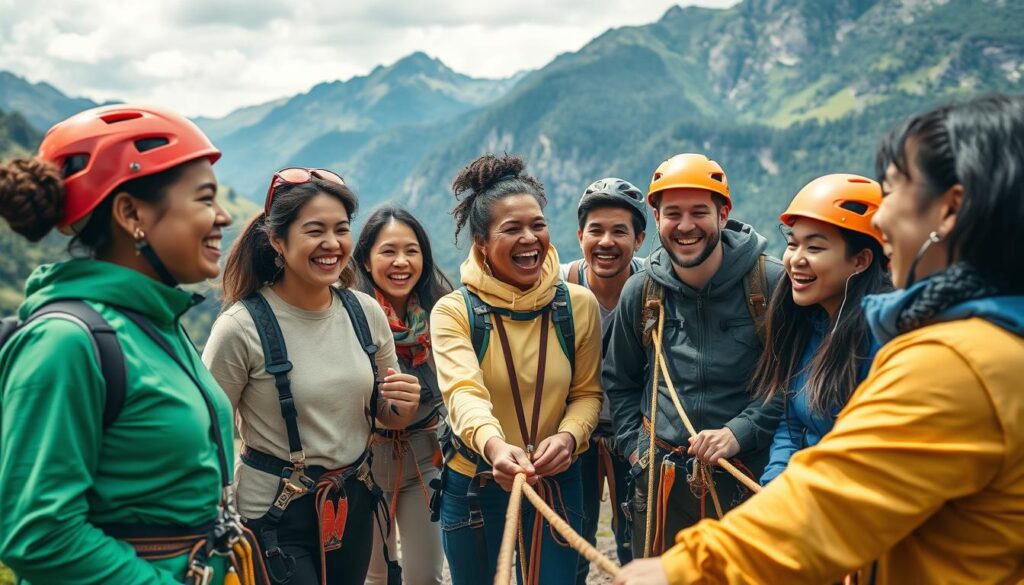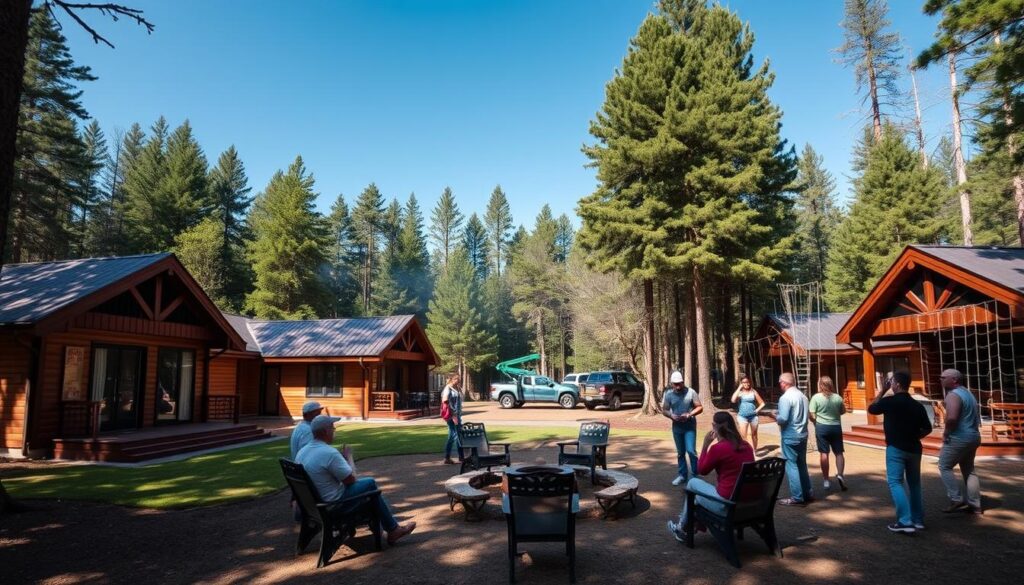Ever wondered why some teams work so well together? It might be because they share experiences outside the office. We’ll look into how team building and travel can create strong bonds and change how teams work together.

Key Takeaways
- Discover how team-building and group travel experiences can build stronger connections among colleagues.
- Understand the psychology behind team bonding during travel and how it can boost collaboration and communication.
- Explore the benefits of planning successful corporate retreats, from city escapes to adventure tours.
- Learn how experiential learning through travel can develop leadership skills and problem-solving abilities.
- Uncover strategies for maximizing employee engagement with strategic travel programs.
Build Stronger Connections: Team-Building and Group Travel Experiences
Going on group trips can really help teams bond and make meaningful connections. By leaving the office, employees get to see each other in new ways. This helps them understand their team better.
Understanding Group Dynamics in Travel Settings
When teams go on adventures or retreats, things change. People have to adapt, solve problems together, and handle surprises. This experience can help break down walls and build stronger bonds.
Creating Meaningful Interactions Through Shared Experiences
Travel experiences can create a strong sense of togetherness and trust. Doing activities together, exploring new places, or facing challenges can deepen connections. It makes employees feel more engaged and bonded.
The Psychology of Team Bonding During Travel
Travel activities play on the psychology of group dynamics. The new places, shared moments, and teamwork can release oxytocin. This hormone helps build trust, empathy, and connection. It makes teams feel closer and more united.
“Embarking on group travel experiences can be a powerful catalyst for strengthening team bonds and cultivating meaningful connections.”
Planning Successful Corporate Retreats: From City Escapes to Adventure Tours
Creating effective corporate retreats is all about strategy. It’s about finding the right mix of team-building and what your team loves. Whether they want to explore cities or go on outdoor adventures, the right trip can bring everyone closer and refresh your team.
Think about your company’s culture and how your team works together. What activities would they enjoy most? You can choose from exciting outdoor adventures to relaxing city breaks. The options are endless.
For corporate retreats that build stronger teams, consider these key points:
- Destination: Pick places that match your team’s interests and energy levels. Whether it’s a lively city or a peaceful nature spot.
- Adventure tourism opportunities: Activities like hiking, rock climbing, or rafting can help teams work better together and solve problems.
- Accommodations: Choose places that are comfortable, easy to get to, and great for meeting new people.
Great company outings mix planned activities with downtime. This lets teams bond in both formal and casual settings. By planning carefully, you can make unforgettable memories and strengthen your team’s connections.
“The best corporate retreats are those that strike a balance between professional development and personal growth. When employees feel valued and engaged, the benefits extend far beyond the retreat itself.”
Looking at successful corporate retreats can help you plan better. Tailor the experience to your team’s needs. This way, you can make the most of group travel and build a more united and motivated team.

Experiential Learning Through Travel: Leadership Development on the Go
Leadership is key for any successful team. Travel offers a great way to develop leaders. It lets employees face challenges, learn about new cultures, and solve problems in new places.
Adventure-Based Team Challenges
Activities like rock climbing and rafting push teams to work together. They learn to communicate and make quick decisions. These experiences help develop important leadership skills.
Cultural Immersion Activities
Travel lets teams see different cultures and traditions. They learn to understand and communicate with people from other backgrounds. This builds empathy and helps them work well in diverse teams.
Problem-Solving in New Environments
Teams face new challenges in unfamiliar places. This helps them think outside the box and find creative solutions. It’s a great way to improve problem-solving and decision-making skills.
Travel experiences are a powerful tool for leadership development. They help teams grow and succeed, both during the trip and back at work.

Maximizing Employee Engagement with Strategic Travel Programs
In today’s business world, having a highly engaged team is key to success. Companies are now using travel programs to boost employee engagement, improve team bonding activities, and encourage incentive travel.
Travel programs can help in employee development, recognition, and keeping them. They offer chances to see new places, experience different cultures, and build stronger team bonds. This helps create a sense of unity and loyalty among employees.
- Incentive travel programs reward top employees with special trips. This motivates them to do their best and help the company succeed.
- Team-building trips and retreats help colleagues bond. They build stronger relationships and a united company culture.
- Travel-based educational and leadership programs help employees grow. They learn new skills, gain new views, and become better leaders.
To make travel programs work best, they must match the company’s goals. Custom-made programs that meet the team’s needs can change the game for any business.
“Travel is the catalyst for employee engagement, team bonding, and personal growth. When implemented strategically, it can be a game-changer for any organization.”
Adding strategic travel programs to your employee engagement plan can lead to great results. It creates a more motivated, collaborative, and dedicated team ready for success.
Conclusion
Team-building through group travel is a great way to make stronger connections and improve work relationships. It helps teams work better together by creating meaningful moments. This makes teams more effective and united.
Activities like adventure challenges, cultural experiences, and corporate retreats are key. They boost employee engagement and problem-solving skills. They also help teams feel closer and more united.
By adding these experiences to their plans, companies can see big benefits. They get a more collaborative and engaged team. This is a lasting way to improve work connections.
Travel-based team-building is very valuable. It has a big impact on work relationships. We encourage companies to try these strategies. They can change their team for the better.
FAQ
What are the key benefits of using group travel for team building?
Group travel helps teams connect better and communicate more clearly. It builds a collaborative work environment. New places and activities help teams bond and strengthen their relationships.
How can travel-based activities help with leadership development?
Travel-based activities like adventure challenges and cultural immersion help develop leadership skills. They offer real-world learning experiences. These experiences improve performance and decision-making at work.
What are some best practices for planning successful corporate retreats?
When planning corporate retreats, pick destinations and activities that match your team’s goals and culture. A good mix of structured events and free time is key. Also, include both urban and outdoor adventures for memorable experiences.
How can travel programs be used to boost employee engagement and retention?
Travel programs, like incentive trips, can boost employee engagement and motivation. They reinforce company culture and offer chances for growth. They show your commitment to your team’s well-being.
What are some key considerations when designing travel-based team-building activities?
When designing team-building activities, think about group dynamics and cultural sensitivity. Consider physical abilities and the balance between challenge and fun. Good activities should encourage teamwork, communication, and problem-solving in a supportive setting.
